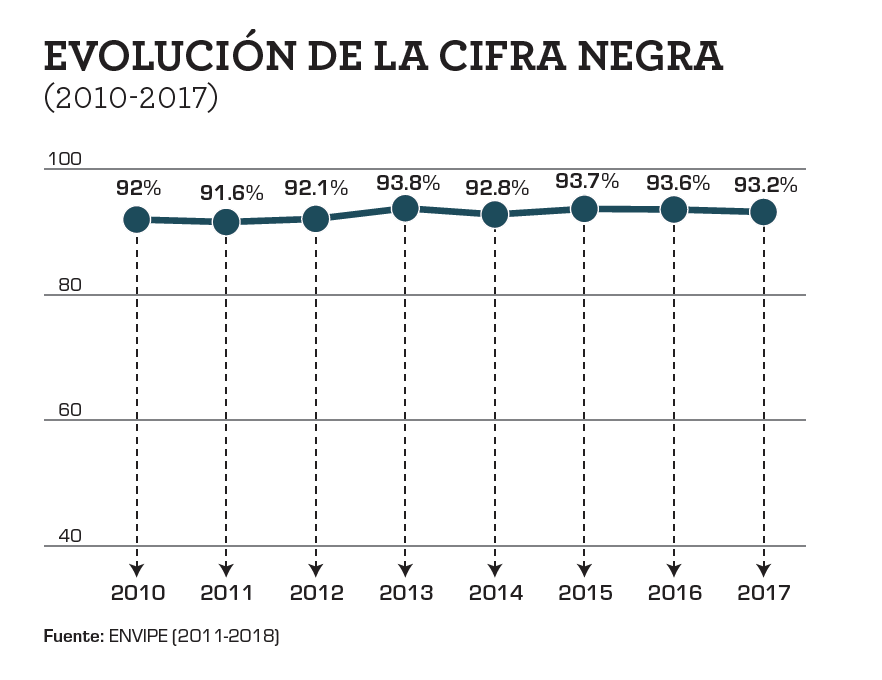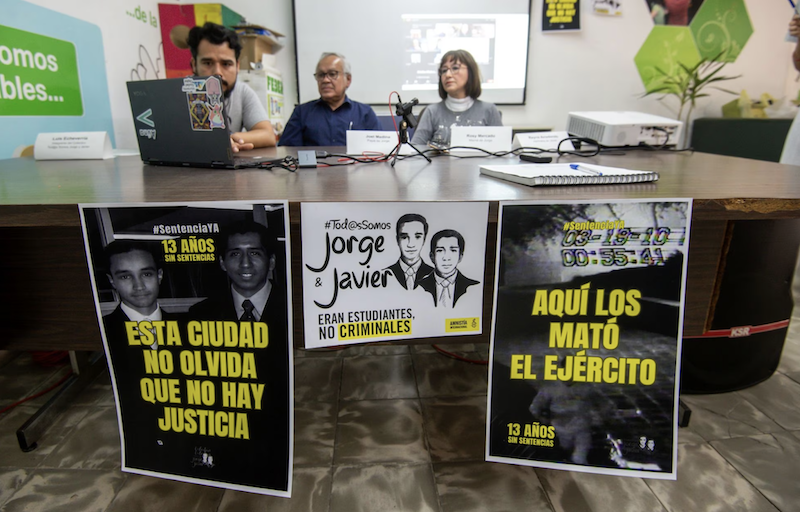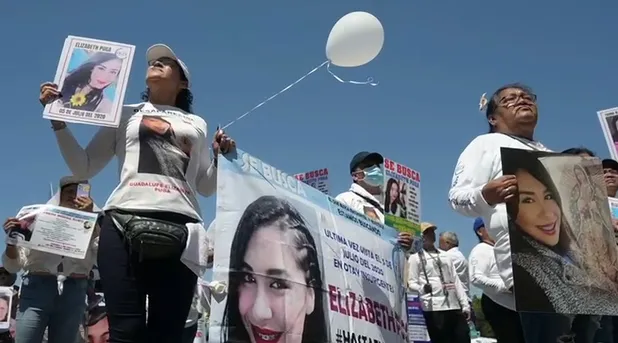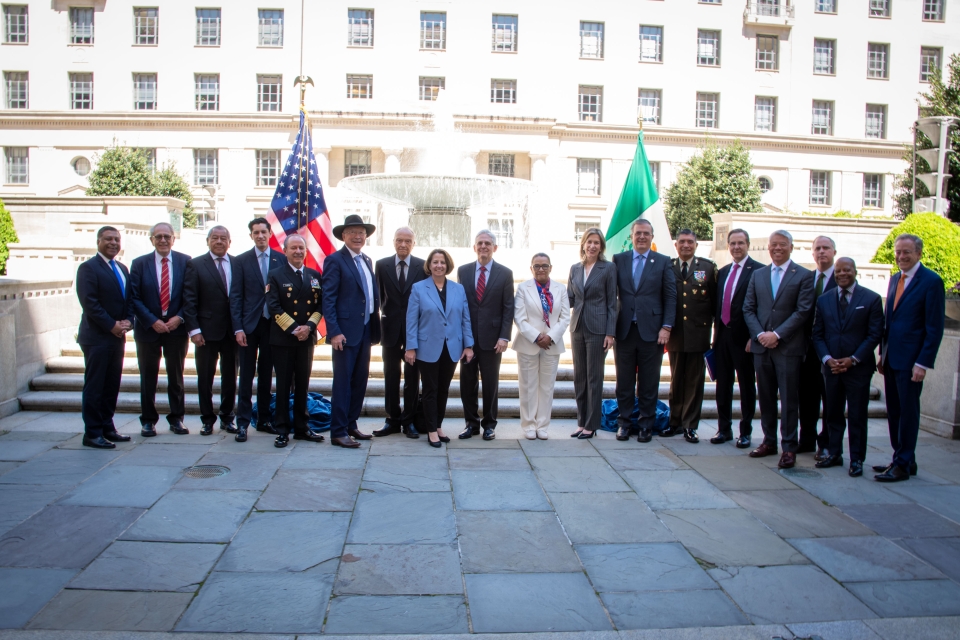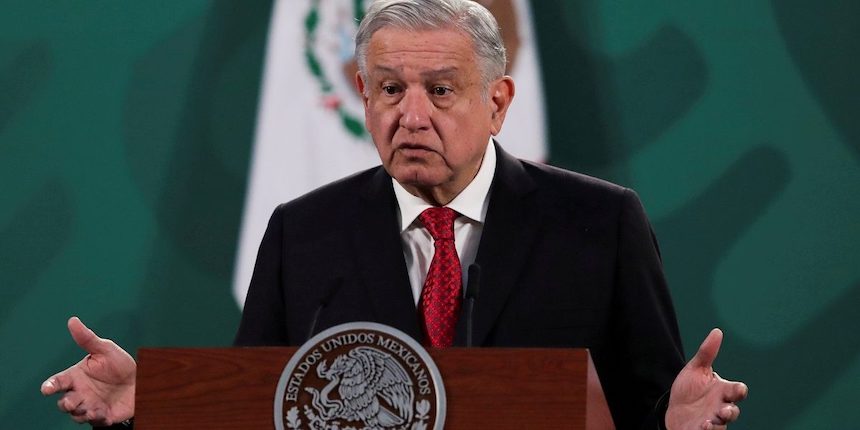03/16/21 (written by tmcginnis) – Two years after the creation of the National Prosecutor’s Office (Fiscalía General de la República, FGR), what is the status of prosecutorial reform in Mexico?
Context
In 2014, Mexico passed constitutional reforms to create a new and improved National Prosecutor’s Office (FGR), emphasizing autonomy from the executive branch. The reforms highlighted the need to replace the Attorney General’s Office (Procuraduría General de la República, PGR) with a new body to combat issues of inefficiency and ineffectiveness. Formalized on January 18, 2019, in what a Washington Office on Latin America (WOLA) report described as “an accelerated process without civil society participation or a true assessment of the candidates,” Mexican Congress, specifically the Senate, chose Alejandro Gertz Manero to assume the role of the first national prosecutor, a position he will hold for nine years. Therefore, given that this new institution is still in its infancy, it remains critically important to evaluate the progress that has been made over the last two years.
Broader demand for an autonomous National Prosecutor’s Office (FGR) can be understood through some rather notable figures. For example, according to INEGI (The National Institute of Statistics and Geography) data cited in a 2019 report by México Evalúa, one of Mexico’s premier think tanks, 93.2% of crimes went unreported or uninvestigated (cifra negra) in 2017 — that is to say, just over nine out of ten crimes that occurred in the country were not investigated by law enforcement institutions (see figure on the right). The creation of the FGR constitutes one of the most difficult challenges for the transformation of Mexico’s criminal justice system since the 2008 constitutional law reforms on security and justice. The recent prosecutorial reforms attempt to ensure[1] that the first national prosecutor, working in tandem with special prosecutors for investigating electoral crimes, human rights violations, corruption cases, etc., function independently of the president and his inner circle, and possess the necessary experiences and capabilities to thoroughly investigate the aforementioned offenses. Correspondingly, given these aims, there have been points of both progress and concern.
Analysis
Initial Perceived Progress
Though recent consensus indicates that the FGR has not achieved its full potential, the “implementing law” of the FGR encouraged a sense of hope and initial perceived progress among Mexican citizens longing for robust accountability mechanisms and oversight, particularly civil oversight. The requirements included the presentation of a Criminal Prosecution Plan (Plan de Persecución Penal). This document outlines the types of cases the FGR will prioritize during investigations, prosecutions, litigation stages, etc., and recognizes the FGR’s various temporal goals. According to a 2020 WOLA report, the plan should essentially “allow observers to analyze whether or not the FGR’s investigative priorities are based on objective data and criminal analysis.”
The implementing law also discusses the creation of a Citizen Council for the FGR. The Citizen Council is a civilian-oriented body charged with offering insights and recommendations regarding the FGR’s performance. Though these judgments are non-binding, the national prosecutor must at least respond to them in some capacity, emphasizing the role of civil society and generating a mechanism of accountability for the national prosecutor. According to the implementing law, members of the Council must be identified within 30 business days after the appointment of the national prosecutor. As stated before, Gertz was appointed on January 18, marking a deadline of March 1, 2019. However, as of August 2020, the Senate still has not indicated its preferences for the five members who will comprise this important body.
Other structural and functional changes that initially sparked hope for progress include specialized prosecutors’ offices, which are meant to increase efficiency. The law additionally states that the nomination process for special prosecutors should be transparent, merit-based, and inclusive of civilian participation. Other requirements include a new investigative framework based on criminal patterns and trends instead of isolated cases; “mixed units” as an acknowledgment of the complexity of various crimes; and the authority of the FGR to assert jurisdiction over certain state-level investigations if ineffectiveness is observed.
Current Concerns
Gertz’s Performance
Though a principal goal of the transition to the FGR remains grounded in generating a sense of autonomy from the executive branch, the choice of Alejandro Gertz Manero as the country’s first national prosecutor appears somewhat contradictory, as noted by Americas Quarterly. Gertz served as President Andres Manuel López Obrador’s security advisor throughout his presidential campaign, setting a dangerous precedent for the young institution’s future. Furthermore, over the past 18 months, National Prosecutor Gertz has struggled to realize the most essential components of his mandate. He has illegally appointed special prosecutors, limited opportunities for citizen participation, and announced certain reform efforts that some view as “inherently incompatible” with the spirit of Mexico’s oral adversarial criminal justice system. According to El Economista, Gertz appears distant, failing to meet with civil society organizations and selectively privileging high-profile cases. Furthermore, as detailed by Animal Político, NGOs, such as the Foundation for Justice and the Democratic State of Mexico (FJEDD), which participates in the #FiscalíaQueSirve (author’s translation: “Prosecutor’s Office that Serves”) collective, warn that Gertz’s Criminal Prosecution Plan fails to comply with legal procedures.
WOLA reports that Gertz’s Criminal Prosecution Plan presents many concerns and violations with respect to the implementing law. Firstly, proposals have not been supported by objective data and ignore the new investigative model based on greater criminal phenomena and trends, privileging the old and inefficient method of investigating based exclusively on the type of crime. In looking at the factors that influence institutional performance, many important elements remain excluded, such as analyzing the factors that hinder victims’ abilities to participate in the investigation of their respective cases. Additionally, crimes that have some of the most detrimental consequences for Mexican society, such as femicide, remain absent from the FGR’s priorities. Finally, and perhaps most importantly, in identifying the FGR’s strengths and weaknesses, the plan describes the implementing law as a weakness. Paradoxically, it is described as “incompatible with the FGR’s fiscal and investigative functions,” even though the implementing law is, itself, the document that legally mandates the institution’s fiscal and investigative responsibilities.
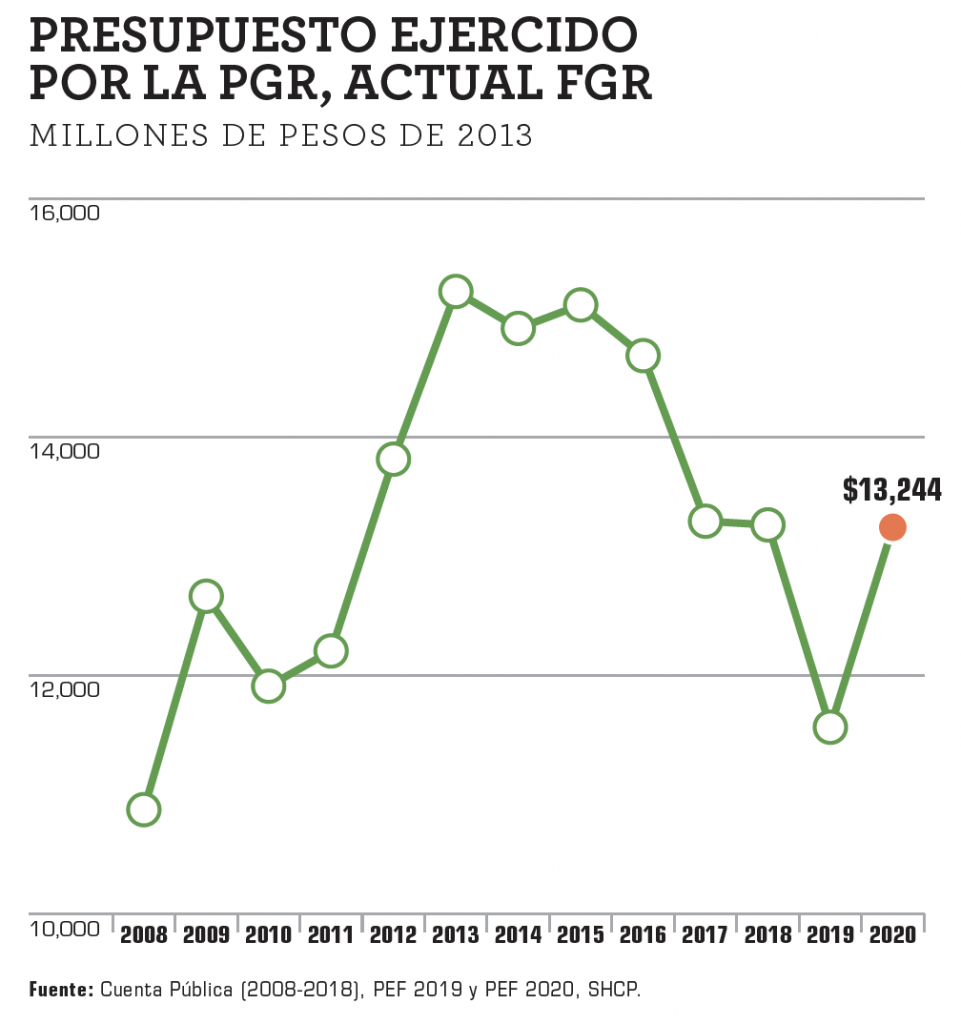
General Concerns
Outside of Gertz’s performance, several other elements generate concern about the FGR’s ability to transform into an effective institution and set important precedents early on. One of the most prominent elements centers around budgetary concerns. According to a México Evalúa analysis, data from 2019 elucidate that fewer resources were allocated for the transition to the FGR than for the maintenance of the operational structures of the PGR. This finding is also mirrored by a more comprehensive 2019 México Evalúa report. As noted by the Mexican think tank, in 2019, the FGR’s budget remained smaller than any other budget the PGR had been presented with since 2008. Furthermore, as stated by WOLA, “while the FGR was allocated a 14.5 percent budget increase in 2020,” adding up to a little over $13 billion pesos, which is still one the lowest budgets since 2011 (see figure on the right). Furthermore, only 0.11% of the budget has been allotted to the transitional body charged with outlining the PGR-FGR transformation in a manner that is in accordance with the implementing law.
Moving forward, it will remain critically important to continue to evaluate the National Prosecutor’s Office’s performance. Its infancy marks a critical juncture in which important precedents can and will be set. Thus, in order to achieve the independent, rights-respecting institution the public hoped for, emphasis should be placed on initiatives, such as increasing civil society participation in the final stages of the Criminal Prosecution Plan, especially considering the absence of the Citizen Council.
Sources
Angel, Arturo. “Senado revisa plan anticrimen del fiscal Gertz; ONG advierten que es ilegal.” Animal Político. February 10, 2020.
Jaime, Edna, María Novoa, Carlos De la Rosa Xochitiotzi, Chrístel Rosales Vargas, Monserrat López Pérez, Janet Kuri, et al. De PGR a FGR: Lineamientos hacia la Transición. México Evalúa. 2019.
Jaime, Edna, María Novoa, Carlos De la Rosa Xochitiotzi, Crístel Rosales Vargas, Monserrrat López Pérez, Miguel Emilio La Rota Uprimny, Pablo García, et al. “De PGR a FGR: Observatorio de la transición 2019.” México Evalúa. 2019.
Rosales, Chrístel. “La Fiscalía busca un refugio para su ineficiencia.” México Evalúa. March 12, 2020.
Sánchez Mercado, Andrea. “El rumbo de la Fiscalía General está escrito en el Presupuesto.” México Evalúa. December 30, 2020.
Velázquez, Marisol. “ONGs piden a la FGR participar en Plan de Persecución Penal.” El Economista. November 4, 2019.
Washington Office on Latin America. “Where Does Mexico Stand in Its Fight Against Impunity? New Autonomous National Prosecutor’s Office Has Yet to Realize its Potential.” Washington Office on Latin America and Due Process of Law Foundation. August 2020.


